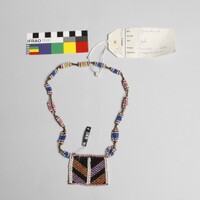Scope and Content
[Source - Chloe Rushovich for FHYA, 2020, transcription of KwaZulu-Natal Museum database extracts: Entry in the Accessions Register (Ethnology Book 1) for Accession 690: "Zulu necklaces constituting a letter. Zulu name Umampapeni. - not in dictionary [later addition in a different handwriting]. (The idea of the cross was attained from the Red Cross on hospital trains and wagons.)." This Accession may be made up of items previously grouped under other Accession Numbers (see notes): Entry in the Accessions Register (Ethnology Book 1) for Accession 616: "Zulu necklet (ulimi)". Entry in the Accessions Register (Ethnology Book 1) for Accession 48: "Native bead necklet of various patterns". Entry in the Accessions Register (Ethnology Book 1) for Accession 49: "Native bead anklet".]
Metadata
Necklet
[ Source of title : FHYA using KZNM materials ]
Object
690P
Creative Commons License: CC BY-NC-ND https://creativecommons.org/licenses/by-nc-nd/3.0/ Unless otherwise stated the copyright of all material on the FHYA resides with the contributing institution/custodian.
KZNM metadata [Source - Chloe Rushovich for FHYA, 2016, using KwaZulu Natal Museum Catalogue Card: Cultural Affinity: Zulu Provenance: Zululand Function: Colour combination incorporates a message Raw materials: Fibre thread. Beads: black, red (few), blue, white, yellow, pink. Comments: No opening Method Obtained: Purchased 1906. Literature: Annals of Natal Museum, Vol. 1, page 159.]
Additional information [Source - Chloe Rushovich for FHYA, 2020, transcription of KwaZulu-Natal Museum object detail catalogue material: Collection: Anthropology Accession #: 00690 Othername: "umampapeni" Received as: Purchase Received date: 1906 Catalogued by: Jeremiah Cullingworth Source: Franz Mayr, possibly Publication: Ann. Natal Museum Vol 1, pp. 159-165: 'Language of colours amongst the Zulus expressed by their bead-work ornaments; and some general notes on their personal adornments and clothing'. By Franz Mayr, but only 690C is illustrated in this publication (Fig. 2). Archival history: See notes in the Accession Record. People: Mayr, Franz Material: Cat.Card:"Fibre thread.Beads: black, red(few), blue, white, yellow, pink." Provenance: Zululand]
Additional information [Source - Chloe Rushovich for FHYA, 2020, transcription of KwaZulu-Natal Museum database extracts: Justine Wintjes 04/12/2019: Notes in the Accessions Register suggest that this Accession was created from the ones originally numbered 48 and 49 (comprising 15 specimens and possibly 1 specimen respectively), which were written off in June 1964, and apparently re-found and moved to Accessions 616 (2 but originally recorded as 3 specimens) and 690 (16 specimens) in 1906 (see note next to 616 in the Register). If this scenario is correct though, there is still an unresolved question around the discrepancy in total number of specimens (18 or 19 across 616 and 690 instead of the ?16 across 48 and 49). Mayr isn't recorded as the source for Accession no. 690 in the Accessions Register but Object 690C is illustrated in Mayr's 1906 Annals publication (see refs): and it is plausible he published items he had collected himself, and may by extension have been the source of the entire original set (16 specimens). This Accession has been selected as part of the Mayr series by the Five-Hundred Year Archive.]
| Event Actor | Event Type | Event Date | Event Description |
|---|---|---|---|
| Five Hundred Year Archive (FHYA) | Online curation | 2017 - | Digital image by Rosemary Lombard |
| KwaZulu-Natal Museum (KZNM) | Custody | 1906 - | Purchased by the museum in 1906 |
| Reverend Father Franz Mayr | Collection | [18-?] | |
| No attribution | Making | YYYY |
If you have difficulty accessing the objects, use these links.

Contributions